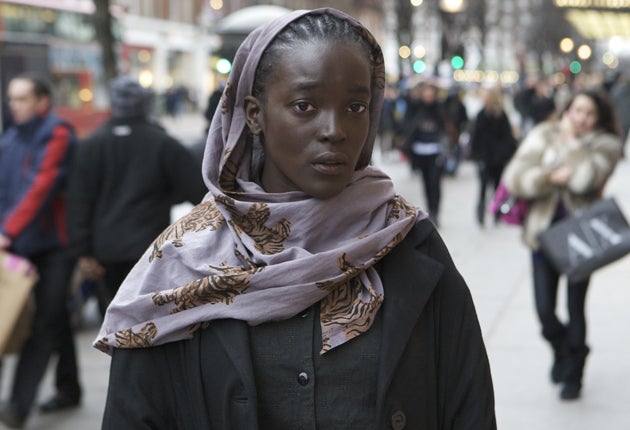I Am Slave, Channel 4<br/>The King Is Dead, BBC3
A chilling tale of modern-day slavery made for challenging bank holiday viewing. Even more challenging was BBC3's latest lunge at entertainment

Your support helps us to tell the story
From reproductive rights to climate change to Big Tech, The Independent is on the ground when the story is developing. Whether it's investigating the financials of Elon Musk's pro-Trump PAC or producing our latest documentary, 'The A Word', which shines a light on the American women fighting for reproductive rights, we know how important it is to parse out the facts from the messaging.
At such a critical moment in US history, we need reporters on the ground. Your donation allows us to keep sending journalists to speak to both sides of the story.
The Independent is trusted by Americans across the entire political spectrum. And unlike many other quality news outlets, we choose not to lock Americans out of our reporting and analysis with paywalls. We believe quality journalism should be available to everyone, paid for by those who can afford it.
Your support makes all the difference.Few continuity announcements have seemed quite as redundant as that which popped up halfway through I Am Slave, warning viewers to prepare for "violence and some strong language".
Violence, strong language or not, if you weren't already distressed by that point, then you likely needed to have your pulse checked. For while ITV viewers soothed their end-of-bank-holiday blues with a dose of Marple, Channel 4 brought us crashing back to reality with an altogether more toxic view of what goes on behind net curtains.
Heading up its slavery season, Jeremy Brock's film gave voice to the invisible plight of the estimated 5,000 people enduring forced labour in London alone. And just as a preceding Dispatches documentary established the scale and legal complexity of the issue, so Brock whittled it down to a tale of individual suffering, inspired by the experiences of Sudanese victim Mende Nazer. As the story jumped back and forth through time, we witnessed how the renamed Malia was snatched from her mountain home, sold into slavery in Khartoum, and subsequently trafficked to the British capital's suburbs to work for a diplomat's family.
It was here where the story's psycho-dramatic heart lay, as 18-year-old Malia remained trapped indoors, a member of the walking dead, her tentative gestures towards escape kiboshed both by the ever-looming menace of her hawk-eyed Arab mistress and her own sense of abject helplessness. Credit should go to Gabriel Range for his quietly masterful direction: coldly lit and claustrophobically framed, this well-to-do detached home was made to seem as forbiddingly alien as a Guantanamo cell. But these scenes' real power derived from the virtuosic passivity of lead actress Wunmi Mosaku. Bereft of dialogue, hers was a performance rooted in the eyes, the window to a reservoir of terror, anger, pride and sorrow. When she eventually took a knife to her wrist, the perverse relief of a woman asserting her autonomy in the only manner available was chillingly palpable.
Elsewhere, however, other elements of her story were so thinly sketched as to appear redundant. Flashbacks to life in Sudan might have been intentionally opaque, but you nevertheless yearned for a measure of exposition. What of the ethnic discord that lay behind her abduction, for instance, reduced to one throwaway slur? Equally, the subplot of her father's search for his daughter barely registered, while a scene of near-reconciliation on a Khartoum street smacked of Hollywoodised contrivance. At times you sensed, dare I say it, a certain laziness on Brock's part, as if he had decided that the sheer, emotive horror of Malia's predicament was enough to carry the drama along. Thankfully, for the most part, it was.
Following the Beeb's recent strategic review, BBC3 came in for the kind of critical fire usually reserved for overpaid chat-show chappies, its detractors expressing disbelief at its flagrant avoidance of the cuts. Such sneering would seem to overlook wilfully the channel's not inconsiderable successes – its current Adult Season, for instance – and yet, boy, when it stinks, does it stink to high heaven. Its latest font of malodorousness, The King Is Dead, has been described as "part spoof job interview, part chat show, part panel show and part character comedy"; you might say it was suffering from an identity crisis were that not ascribing rather too much sentient thought to its conception.
To expand: a panel of three comics, led by The Inbetweeners' Simon Bird, interview three celebrities vying to fill the shoes of a famous public figure. In this week's opener, said position was the United States president, the cue for 30 minutes of dismally aimless japery which matched spurious quizzes with Peaches Geldof flaunting her ignorance and James Corden frottaging a man dressed as a vending machine. Pity poor, rictus-grinned Sarah Beeny, whose demeanour was that of an interplanetary visitor stuck at a student rag-week party. Bird has seen fit to compare his show to Shooting Stars, though never has Vic and Bob's brand of whimsical surrealism seemed such a precious commodity.
Join our commenting forum
Join thought-provoking conversations, follow other Independent readers and see their replies
Comments